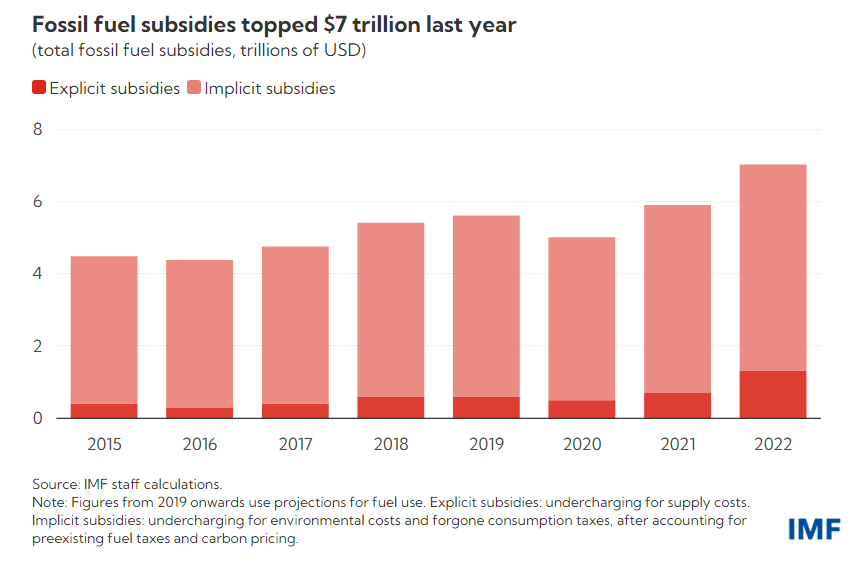
How fast is the energy transition in Europe and Italy towards the abandonment of fossils and decarbonization progressing?
International commitments aim to reduce greenhouse gas emissions and limit global warming to 1.5 degrees in the coming decades. But, when it comes to discussing decarbonization and energy transition, it's important to look at the data. There is reason for optimism, but the global fossil fuel backdrop is particularly complex, and the phase-out will necessarily be slow and gradual.
In the last ten years, there has been a nearly 15% increase in worldwide energy consumption. In the preceding decade, from 2000 to 2010, the rise was close to 25%. Despite the frequent discussion of eco-friendly initiatives in recent times, fossil fuels continue to hold a significant share in the world's energy consumption.
This is evidenced by the enormous sums that governments worldwide invested as subsidies for fossil fuels - including oil, gas, and coal - just last year. Direct and indirect supports amounted to a record $7 trillion US dollars in 2022, an increase of $2 trillion from 2021, and a total of 7.1 percent of the global GDP.

Unveiling energy trends: Italy's role in a fossil fuels global context
Looking at the data, from 1965 to last year, 2022, the percentage in Italy of primary energy from fuels has remained almost unchanged, going from 84.53 percent in 1965 to 83.4% in 2022.Not exactly a revolution. But there's a “but”. It's not a situation that only concerns us. Coal, just for instance, has retained its significance as a primary contributor to global energy consumption since 1900 and till holds the position of the second-largest energy source, supplying 25% of the world's energy requirements.
From coal alone, we Italians have gone from percentages of 10.47 in 1967 to 4.97 in 2022.
Moreover, it's worth considering that our emissions impact on the entire planet remains relatively small, given that we don't even rank among the top 10 polluting nations. The top 5 positions in this ranking, from the 20th century to today, are occupied by countries such as China, the United States, India, Russia, and Japan, responsible for sixty percent of coal emissions in 2020. In the transition to the new millennium, historical emitters like the United States were overtaken by the colossal Chinese emissions and pursued by new entrants from developing economies, such as India, Brazil, and Indonesia.
Empowering a green transition: Europe marks historic renewable overtake in first half of the year
Anyway, the good news, in terms of sustainability, is that the percentages of reliance on coal have steadily diminished over the years up to 2021. To the point where there's been talk of a "structural decline" in coal in Europe, which accounted for less than 10% of electricity production on the continent. An increasingly greener scenario, to which an additional detail must be added: the use of renewables is rising.
The EU has put in considerable effort to speed up the adoption of renewables, and there has been a significant surge in solar capacity expansion. Following a record-breaking increase of 33 GW in 2022, the momentum has carried over into 2023. Looking at Italy alone, the percentage of primary energy from green sources - such as solar, wind, hydroelectric, bioenergy, and wave power - has grown from 5.54 percent in 1990 to 16.60 percent in 2022.
Regarding solar, Italy added 2.5 GW of capacity in the first half of 2023, exceeding the total of 3 GW for the entire year of 2022. Furthermore, in Europe, the fossil landscape seems to have experienced a shift in the first six months of 2023, reaching its lowest point, at the very least, since the year 2000. From January to June 2023, the boom in energy costs and the resulting decrease in energy demand (- 5% and - 86 TWh compared to the same period in 2022) have reduced fossil fuel-based electricity production in the EU by 17%, while solar and wind energy have seen an increase.
Thanks to higher fossil fuel prices and significant reductions in imports from Russian pipelines (-75% in the first half of the year compared to 2022), solar and wind power represented over 30% of the European Union's electricity production for the first time in May and June.
Energizing renewable adoption: the vital role of TES Thermal Energy Storage
Worldwide, the Russo-Ukrainian conflict has heightened concerns about energy security and autonomy, accelerating the global race towards renewable energy production, which is expected to increase by a third in 2023 through extensive installations of solar and wind power systems. There's talk of a global threshold of 4,500 GW of renewable energy, equivalent to the total energy production of China and the USA combined.
How to boost the presence of inherently variable renewable sources, like wind and solar in the energy mix, all the while guaranteeing a balance between supply and demand? Magaldi Green Energy posed this question long before geopolitical issues and the urgency of global warming spurred a decisive push for clean and green energy.
And the answer was: thermal energy storage - TES.
Decarbonizing the future: MGTES sand battery powers renewable evolution
As innovators initially and as members of the LDES Council thereafter, we were the first in the world to count on TES potential. We designed and developed a sand-based TES technology tailored for industries that are still heavily reliant on heat. Using TES Thermal Energy Storage can facilitate the delivery of renewable, environmentally friendly heat to industrial operations, such as chemical or food and beverage manufacturing. MGTES is adaptable and scalable for industrial applications, making it a perfect choice for renewable energy communities too.
Nowadays, we know that TES can:
- reduce global system costs by a whopping $540 billion annually
- accelerate the adoption of renewable energy
- optimize grid utilization
- offer a cost-effective solution for decarbonizing heat, particularly in high-temperature contexts
This marks a decreasing inclination toward an always less partial goodbye to a fossil-bias idea of the worldwide energy policies.
Meet our MGTES - Magaldi Green Thermal Energy Storage, your made in Italy sand battery.



